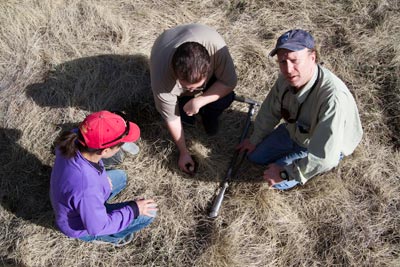A three-year, $1.9 million grant from the National Science Foundation will fund the creation of an integrated online library of Southwestern species that make up as much as 70 percent of life on the Colorado Plateau.
The project, known as the Southwest Collections of Arthropods Network, or SCAN, will be a first: Currently, there is no single Southwest collection of ground-dwelling arthropods—spiders, ants, grasshoppers and beetles—available to scientists or the public.
Northern Arizona University’s Colorado Plateau Museum of Arthropod Biodiversity and nine cooperating arthropod collections will create digital images of 15,000 specimens, develop new electronic identification techniques and produce a virtual library with data for more than 750,000 specimens.
“This project and efforts like it throughout the nation will make the vast amount of information gathered about biodiversity in the United States easily available,” said Neil Cobb, the project’s principal investigator and curator of the Colorado Plateau Museum of Arthropod Biodiversity in NAU’s Department of Biological Sciences.
“It will be particularly valuable to researchers examining changes in biodiversity resulting from climate and land-use change, invasive species and other processes.”
However, without complete information on arthropod species, their distributions and changes over time, it is difficult to assess changes in biodiversity.
“There is still so much we do not know about the tremendous diversity of arthropods in the West, even as the landscape changes around us,” said Laura Huenneke, vice president for Research at NAU.
“In addition to advancing research,” Huenneke said, “this project will give our students, including undergraduates, great training in ecology, systematics and cyber-infrastructure—network and computing applications that are changing the way biology is done.”
The SCAN project will be undertaken in partnership with Arizona State University, Colorado State University, Denver Museum of Nature and Science, Harvard, New Mexico State University, Texas A&M University, Texas Tech University, University of Arizona, University of Colorado Boulder, University of Kansas and University of New Mexico. SCAN was funded through the National Science Foundation’s Advancing Digitization of Biological Collections program.



